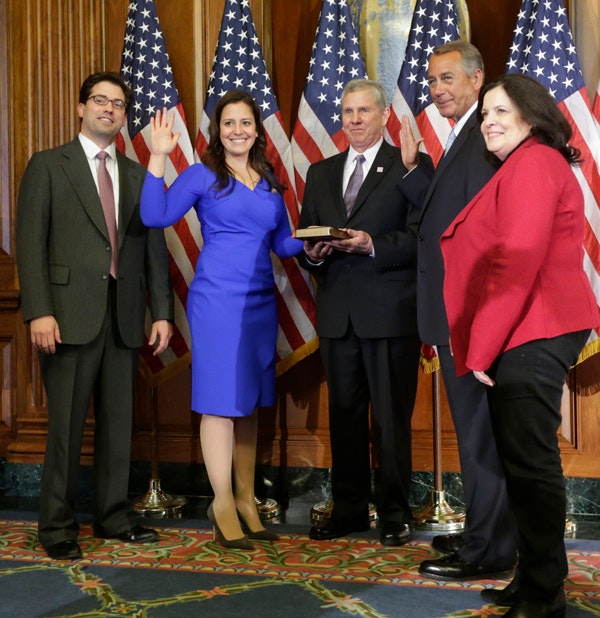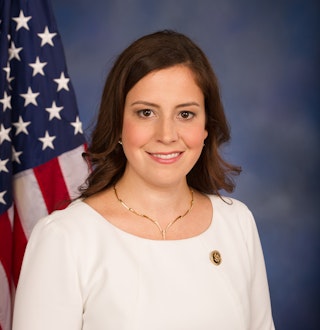The Millennial Policymaker
Rep. Elise Stefanik (R-N.Y.) is one of the first of the next generation of policymakers. And the 32-year-old proudly espouses millennial values: transparency, working across divisions, and accepting immediate feedback.
 House Speaker John Boehner of Ohio administers the House oath to Rep. Elise Stefanik, R-NY., during a re-enactment of her swearing-in ceremony, Jan. 6, 2015, in the Rayburn Room on Capitol Hill in Washington. (AP Photo/Pablo Martinez Monsivais)
House Speaker John Boehner of Ohio administers the House oath to Rep. Elise Stefanik, R-NY., during a re-enactment of her swearing-in ceremony, Jan. 6, 2015, in the Rayburn Room on Capitol Hill in Washington. (AP Photo/Pablo Martinez Monsivais)
Elise Stefanik (R-N.Y), 32, is the youngest female ever elected to Congress. In this Quick Take interview, the new leader reveals that she is not afraid of taking different approaches to problems. A former Bush administration staffer, she deeply values her millennial point of view.
Millennials are known to value instant feedback, work collaboratively with others, and are not seen as particularly partisan. So how do those traits come into play in solving public problems?
When I first decided to run for Congress, the assumption was that since I was young, and a young woman in particular, I didn’t seem like the traditional congressional candidate or member of Congress. What I found was that people across all age ranges were looking for a new generation of leadership, a willingness to reach across the aisle and solve the long-term issues facing this country, whether in economics or national security.
What I found was that people across all age ranges were looking for a new generation of leadership, a willingness to reach across the aisle and solve the long-term issues facing this country, whether in economics or national security.
I found that being a millennial is a strength in policy making. I’ve been able to forge relationships across the aisle and within my own party. I also think that I bring a fresh perspective to how we govern.
I’ve been very focused on setting the standard for transparency in government and leading by example. I think I am the only representative who posts every single vote I take on Facebook. That accessibility and accountability to my constituents gets very positive feedback across party lines. I also post my schedule so that my constituents can see where I am working, who I’m meeting with, and what I’m working on.

Why is transparency so important to you?
Transparency is important in the 21st century, particularly among millennials. We’ve come of age when you can order a product on Amazon and look up your location on Google Maps. Information is at your fingertips and the federal government should be channeling 21st century technology to make government more accessible to the people. That’s why I believe it is important to bring transparency to my office.
Additionally, I recently introduced the Edit Act, which would require the Library of Congress to use “track changes” as bills go through the legislative process. People should be able to see changes in our legislation as it moves through the process, just like they do when someone is editing a document.
How do you see this demand for transparency and responsiveness starting to change government?
I’ve gotten some of the best ideas through feedback, whether through Facebook or one-on-one constituent meetings. The bills that I’ve introduced have come from constituents’ ideas in the district.
I’ve gotten some of the best ideas through feedback, whether through Facebook or one-on-one constituent meetings.
The Support Our Military Caregivers bill that I introduced and we passed without opposition will streamline an important V.A. program. That came from a constituent reaching out to my office, talking about an issue she was facing.
 Rep. Elise Stefanik, R-N.Y., takes a selfie with a 4-H group from New York on the House steps, Oct. 23, 2015. (Photo By Bill Clark/CQ Roll Call)
Rep. Elise Stefanik, R-N.Y., takes a selfie with a 4-H group from New York on the House steps, Oct. 23, 2015. (Photo By Bill Clark/CQ Roll Call)
Issues like rising student debt are important for families but particularly for millennials. How do you see that issue being solved? What insights do you bring as a millennial to the challenge?
I had the opportunity to chair the Millennial Task Force within the Republican Policy Committee. I hosted four hearings in Washington and one in my district. A theme that’s come up is the historic student loan debt that my generation will be facing: over a trillion dollars nationally of student loan debt.
That will have an impact, long-term, on my generation. Unfortunately, it kicks down the road the ability for millennials to purchase a home and to save for retirement because they’re saddled with this debt.
One idea that I heard from a business that is helpful in attracting millennials to their workforce is a student loan repayment program. Similar to how a business can contribute to a 401k as a tax-free benefit for an employee, some businesses are contributing to student loans. I want to make that tax-free up to $10,000 on the employee. It’s a great way to recruit millennials but also ensure millennials are able to pay off their student debt faster.
In order to truly solve the issue of student loan debt, we have to address college affordability. The compliance cost on a higher education institution has expanded tremendously and we need to address those top down regulations.
Colleges are trying to tackle this. Best practices are being shared. One example comes from Mitch Daniels, president of Purdue University. He has been able to freeze college tuition for incoming freshmen. And they’ve done that by addressing the budget issues internally, but he’s also been able to share those best practices with other universities.
We need to ensure that the federal government isn’t requiring top-down mandates that increase the cost for higher education institutions.
What message do millennial leaders who believe in private markets and the global economy have to offer today?
Millennials are inherently entrepreneurs. When I go to college campuses, and I have a number of them in my district, many say they want to become entrepreneurs and start their own businesses.
Flexibility in government and policies that allow nimble businesses to start from the ground up is very exciting. Look at how millennials have already changed our economy. Think about the founding of Facebook. It has completely changed the way the information economy works and how social networks work.
This next generation of entrepreneurs will focus on growing the economy, starting small businesses, disrupting sectors in a positive way so that there is more direct access to the consumer. I hope those ideas are then shared with government.
This next generation of entrepreneurs will focus on growing the economy, starting small businesses, disrupting sectors in a positive way so that there is more direct access to the consumer. I hope those ideas are then shared with government.
Let’s circle back to how responsiveness and transparency may change government. Do you see those forces having some effect within the Congress itself?
Absolutely. As I said, I’m trying to lead by example. But, if you look at the local level, there are mayors, county executives, and others who are using data, transparency, and technology to have a more efficient, effective government.
There is a great organization called Open Gov that is partnering with municipalities to create a more data-driven process when it comes to policy-making. That’s an example of millennials bringing positive change to public policy.

How does being a young female legislator affect how you do your job?
It makes me more effective, although it was viewed as a weakness when I was first running. I really leaned into the fact that I am a non-traditional member of Congress. I am about half the average age of a member of Congress and I believe that’s a strength. It’s allowed me to be a resource for many colleagues who are looking for innovative ideas and ways to reach out to the millennial generation.
Young women across the country of all ages write my office. They talk about their goal to eventually run for office and change their community. That’s inspiring and incredibly humbling.

